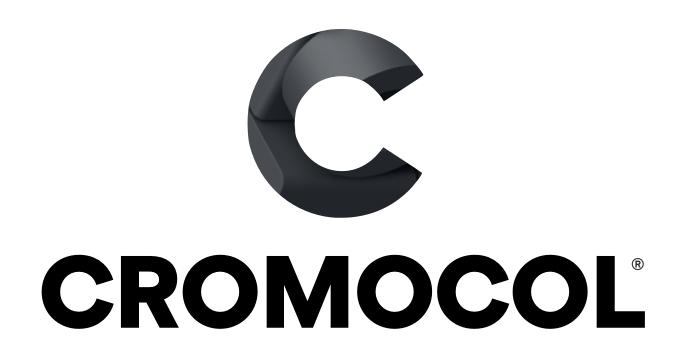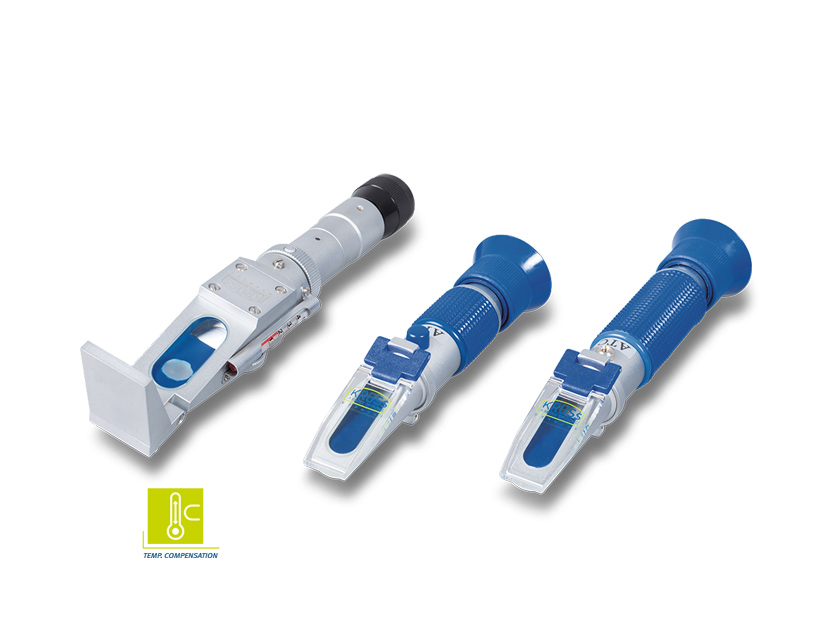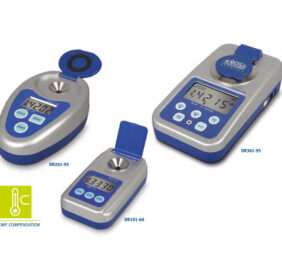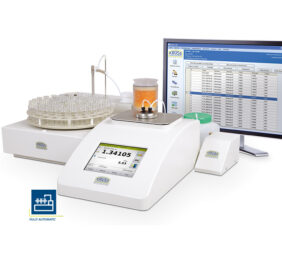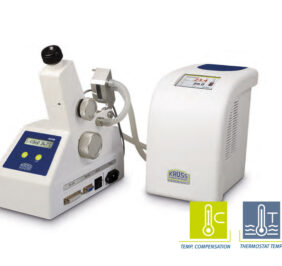Description
Handheld Refractometers
Mobile in use and proven a thousand times over
The handheld refractometers are easy to use, very robust and require no batteries. The devices differ mainly in the selectable scales, e.g. for the determination of the salt content, water content in honey, serum protein content, Oechsle, Brix and potential alcohol content as well as ethylene- and propylene glycol content. No manual conversion is required thanks to the scales and application errors are ruled out.
- Small size for mobile use
- Automatic temperature compensation
- High resolution of the scale areas
- Robust and compact design
- Easy calibration and adjustment
Typical applications
The handheld refractometers HR series are the ideal solution for the petrochemical, automotive, aviation, metal processing and food industries.
- Identity test and concentration determination
- Outgoing goods inspection
- Stability test
- Quality and purity control of raw materials and end products
- Determination of the sugar concentration
- Determination of water content in honey
- Examination of urine samples
Model specifications
| Handheld refractometer | Scale | Measurement range | Measurement accuracy | Application |
|---|---|---|---|---|
| HRB10-T | BriBrix | 0–10 %Brix | ±0.1 %Brix | Determination of sugar content in fruit, grapes, juices, vegetables, foods and cooling liquids |
| HRB18-T | Brix | 0–18 %Brix | ±0.1 %Brix | Determination of sugar content in fruit, grapes, juices, vegetables, foods and cooling liquids |
| HRB32-T | Brix | 0–32 %Brix | ±0.2 %Brix | Determination of sugar content in fruit, grapes, juices, vegetables, foods and cooling liquids |
| HRB62-T | Brix | 28–62 %Brix | ±0.2 %Brix | Analysis of chemical and technical fluids, e.g. oils, greases, radiator fluids and lubricants |
| HRB82-T | Brix | 45–82 %Brix | ±0.2 %Brix | Analysis of highly concentrated sugar solutions as well as chemical and technical liquids, e.g. oils, fats, radiator fluids and lubricants |
| HRB92-T | Brix Baumé Water content in honey |
58–92 %Brix 38–43 °Bé 12–27 % Water content in honey |
±0.5 %Brix ±0.5 °Bé ±0.5 % Water content in honey |
Examination of highly concentrated sugar solutions as well as analysis of fats, lubricants and food. Examination of honey to the water content (according to guidelines of the German Beekeepers’ Association). Determination of the relative density with respect to the Baumé scale. |
| HRB90 | Brix (with thermometer 6–36 °C) | 0–90 %Brix | ±0.2 %Brix | Universal handheld refractometer for determining the sugar content of fruit, grapes, juices, vegetables, foods, oils, fats, coolants, lubricants and other sugary substances |
| HRH30-T | Water content in honey | 12–30 % Water content in honey | ±0.1 % Water content in honey | Examination of honey to the water content (according to guidelines of the German Beekeepers’ Association). |
| HRND | Refractive index | 1.3330–1.5170 | ±0.0005 | Universal handheld refractometer for refractive indices. Measuring range covers the most frequent substances of the pharmacy requirement. |
| HRS10-T | Salinity (NaCI) Specific gravity |
0–10 % 1.000–1.070 |
±0.1% ±0.001 |
Salt content determination (NaCl) in liquids, such as in seawater, in drinks and preservatives of food. Determination of the specific density of liquids at 20 °C with respect to water. |
| HRS28-T | Salinity (NaCI) | 0–28 % | ±0.2 % | Salt content determination (NaCl) in liquids, such as in seawater, in drinks and preservatives of food. |
| HRM18-T | Refractive index Serum protein Specific gravity of urine (UG) |
1.3330–1.3600 0–12 g/dl 1.000–1.050 UG |
±0.0005 ±0.2 g/dl ±0.002 UG |
Analysis of urine samples for refractive index and specific gravity, as well as protein content in serum. |
| HRO32-T | Brix Oechsle Potential alcohol content |
0–32 %Brix 30–130 °Oe 4.4–19 % Alcohol |
±0.2 %Brix ±1 °Oe ±0.1 % Alcolhol |
Examination of grape must and alcoholic beverages. |
| HRKFZ-T | Ethylene and propylene glycol (antifreeze) Battery acid |
-50–0 °C 1.10–1.30 g/cm³ |
±5 °C ±0.01 g/cm³ |
Determination of acid concentration in batteries and measurement of glycol content in coolants. |
